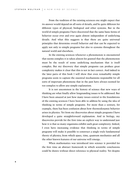From the tradition of the existing sciences one might expect that its answer would depend on all sorts of details, and be quite different for different types of physical, biological and other systems. But in the world of simple programs I have discovered that the same basic forms of behavior occur over and over again almost independent of underlying details. And what this suggests is that there are quite universal principles that determine overall behavior and that can be expected to apply not only to simple programs but also to systems throughout the natural world and elsewhere.
In the existing sciences whenever a phenomenon is encountered that seems complex it is taken almost for granted that the phenomenon must be the result of some underlying mechanism that is itself complex. But my discovery that simple programs can produce great complexity makes it clear that this is not in fact correct. And indeed in the later parts of this book I will show that even remarkably simple programs seem to capture the essential mechanisms responsible for all sorts of important phenomena that in the past have always seemed far too complex to allow any simple explanation.
It is not uncommon in the history of science that new ways of thinking are what finally allow longstanding issues to be addressed. But I have been amazed at just how many issues central to the foundations of the existing sciences I have been able to address by using the idea of thinking in terms of simple programs. For more than a century, for example, there has been confusion about how thermodynamic behavior arises in physics. Yet from my discoveries about simple programs I have developed a quite straightforward explanation. And in biology, my discoveries provide for the first time an explicit way to understand just how it is that so many organisms exhibit such great complexity. Indeed, I even have increasing evidence that thinking in terms of simple programs will make it possible to construct a single truly fundamental theory of physics, from which space, time, quantum mechanics and all the other known features of our universe will emerge.
When mathematics was introduced into science it provided for the first time an abstract framework in which scientific conclusions could be drawn without direct reference to physical reality. Yet despite




